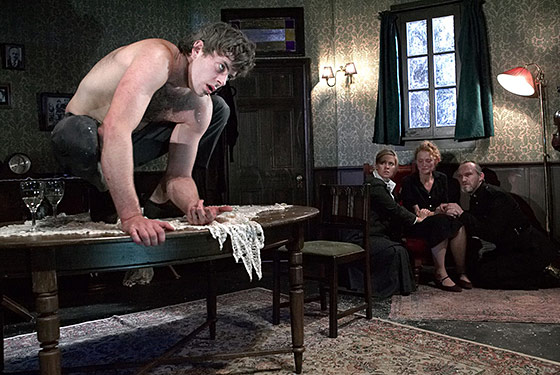
What kind of vermin is Gregor Samsa, anyway? No one’s ever been able to pin it down. Late in Franz Kafka’s The Metamorphosis, a charwoman refers to Gregor as a “dung beetle,” but Vladimir Nabokov was of the opinion “that the good woman is adding the epithet only to be friendly.” Even the phrase “gigantic insect” isn’t a perfect translation from the German. It’s clear Kafka meant to evoke something non- or even anti-human. He shows us Gregor’s “numerous legs … pitifully thin compared to the rest of his bulk,” his broad, “convex” back, and his toothless, increasingly useless jaws ’ yet he also has eyelids and a neck. John Updike called Gregor an “absolutely literary” creation, a rebuke to visual literalness and deliberately “impossible to picture.”
So putting Gregor onstage, as a physical and visual (if not literal) entity, is one hell of a tall order. I’m happy to report that adapter, director, and limber star Gisli Orn Gardarsson, maestro of the Icelandic-English co-production Metamorphosis: A Six-Legged Nightmare by Franz Kafka, has managed to pull it off, on his own wriggling terms. Unfolding on a shadowy set — a two-story flat cutaway, with Gregor’s cell upstairs and the family living room below — this broadly comic, occasionally dancelike interpretation of modern alienation’s foundational parable makes we wish I’d seen more of Gardarsson’s work (his Woyzeck, for instance, which, like Metamorphosis, was scored with ghost-pop loops by Nick Cave and Warren Ellis). His Gregor is an entirely physical creation and the contorted centerpiece of the show. (I can’t recall a full-body performance this affecting, this indelible since Aaron Monaghan in The Cripple of Inishmaan.) As a man suddenly and inexplicably transformed into something socially abominable and economically inconvenient — a burden to his horrified, increasingly pig-eyed middle-class family — Gardarsson makes his own body, well, Kafkaesque. (And, yes, maybe a teensy bit District 9 — toward the end, he takes on a distinctly prawnlike posture that’s customized to break whatever is left of your heart.) The terrific crick in the neck he must be nursing is well worth it.
Gardarsson has no costume or any practical effects beyond light and sound cues. He’s simply man in a suit; yet that’s not what we see. We become so accustomed to Gregor’s scuttling suite of physical abilities and limitations, it’s almost terrifying when Gardarsson (a tall, broad-shouldered fellow) takes his bow standing upright, as himself. In a stroke of scenic genius, Gregor’s bedroom has been rotated 90 degrees (the bed against the wall, the lamp protruding toward us) and gashed with handholds, which allow Gregor perpendicular movement — but also seem to let in the cold from outside. Simply getting from the bed to the door is an enormously effortful and impressive suite of acrobatics. And the moment where Gregor all-too-fleetingly enjoys the potential of his horrific new physique is a simple celebration of heroic discovery that would be the envy of any wall-crawler (even the Broadway species). Gardarsson’s approach does trade away some of its main character’s interior psychology, which allows for a greater focus on the family, Gregor’s sister Greta (Nina Dogg Filippusdottir) in particular. Results here are mixed: Outside of Gregor’s eye line, the family characters become even more clownish and contemptible when forced to stand on their own. The acting, like the staging, is broad, expressionistic, and dancelike, and we occasionally find ourselves at the brink of simple misanthropy, missing some of Kafka’s wry, injured humanism. A few historical retrojections (including a more deliberate nod to the rise of fascism) have also been added, though I’m not sure what’s actually been added, in doing so. But then, this brief, vivid Metamorphorsis is a simpler machine than its source story, more of a grand tragicomic manipulation than a deep social critique. It deserves a place in your nightmares.




